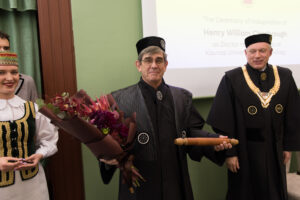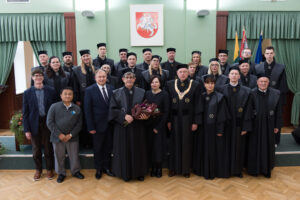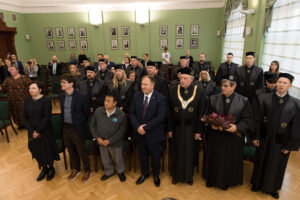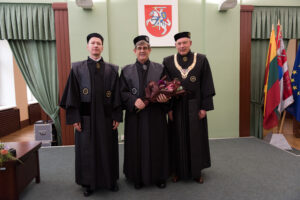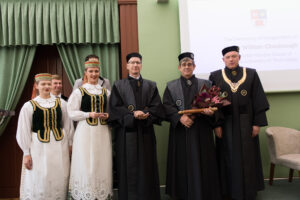The ranks of Honorary Members of Kaunas University of Technology (KTU) recently welcomed Dr Henry William Chesbrough, a pioneer of the theory of open innovation and a professor at a university in Italy. The scientist, who has been working in the field of open innovation for more than 20 years, says that the application of this theory significantly changes the innovation ecosystem not only abroad, but also in Lithuania.
Prof Dr Henry Chesbrough was awarded an Honorary Doctorate on 11 October, during the 3rd IEEE TEMS-ICTE 2023 conference on Digital Ecosystems for Sustainable Society, organised by the School of Economics and Business. By the resolution of the KTU Senate, the scientist has been appointed honorary doctorate for his outstanding achievements in the field of technology and open innovation management in the international arena, sustainable cooperation and the mentoring of the university’s young scientists.
“Today is a memorable and significant day for Kaunas University of Technology. We are witnessing one of the most important events in the life of the University, when a distinguished member of the academia is awarded the regalia of an honorary doctorate. We hope that with your kind acceptance of these Regalia, your relationship with Lithuania and our university will become stronger and you will become a great KTU ambassador”, during the ceremony KTU Rector Eugenijus Valatka congratulated Chesbrough.
“It is a great honour to join the ranks of honorary doctors at KTU, and I hope and trust that my collaborations with KTU will continue long after this wonderful event”, he says.
The pioneer of open innovation
Chesbrough is a professor at the Luiss Guido Carli University in Italy, having previously held a professorship at the University of California, Berkeley, in the United States. He holds a Bachelor’s degree in Economics with a minor in Engineering from Yale University, from which he graduated with honours. Subsequently, Chesbrough was awarded an MBA from the Graduate School of Business at Stanford University and a PhD in Business Administration from the University of California.
“Open innovation is about knowledge flows in the innovation process that move across organisational boundaries. The primary flows are Outside-in, where useful knowledge is accessed from the outside, and incorporated into a new offering for the innovator’s own business; and Inside-out, where the innovator’s knowledge flows outside of her organisation for others to use in their innovations”, says the expert.
This theory is also widely developed at the KTU School of Economics and Business: it is used as a foundation for preparing bachelor’s and master’s theses and executing doctoral research. According to the Honorary Doctor of KTU, this theory is also of great importance for Lithuanian businesses seeking to apply various innovations.
“Based on my research, the European Commission introduced Open Science, Open Innovation, Open to the World concept that directs Lithuanian and other European countries research and innovation towards exchange of knowledge and more innovation in Europe. I believe that Lithuanian companies, especially those participating in Horizon Europe calls, apply open innovation principles, even if they sometimes do not call it open innovation”, says the author of 5 books based on the theory of open innovation.
Advances science together with KTU
During his scientific career, Chesbrough has been awarded more than 20 academic prizes, authored seven monographs, published more than 140 scientific publications, and has been cited more than 100 thousand times.
I am text block. Click edit button to change this text. Lorem ipsum dolor sit amet, consectetur adipiscing elit. Ut elit tellus, luctus nec ullamcorper mattis, pulvinar dapibus leo.
“The primary collaboration with KTU has been through Asta Pundzienė. She was a visiting scholar with my colleague David Teece at Berkeley. But over many conversations I have managed to infect her with the open innovation virus. And she has called my attention to another knowledge flow pattern in open innovation, the pattern of Inside-in knowledge flows, where useful knowledge moves across internal organisational boundaries like silos”, he says.
According to Pundzienė, open innovation in healthcare is about applying the knowledge accumulated by all stakeholders in the health ecosystem to produce tangible benefits for patients and society.
“Digitalisation is one of the innovations that are particularly receptive to the involvement of all actors in the health ecosystem, as digital technologies require expertise in clinical, information and communication technologies, process management, economics and other areas. Therefore, open innovation teaches how patients, together with healthcare professionals and institutions, information technology experts, decision-makers and other actors, can co-create digital health services that radically change the experience, accessibility and affordability of healthcare services”, says the expert.
The study on digital health platforms has provided an insight into the comparison between the Lithuanian and Spanish healthcare systems and has revealed one significant difference: in Spain, the knowledge needed to develop digital health services is brought in from the outside, while in Lithuania it is mobilised from within the healthcare institutions. Also, in both countries, digital health services create clinical value that generates economic value.
“There is a need to encourage other actors in the ecosystem, especially policy makers, as Lithuania currently lacks the necessary policy solutions and appropriate regulation for digital health services to develop as rapidly as in other EU countries,” says Pundzienė.
Provides an opportunity to acquire relevant knowledge


